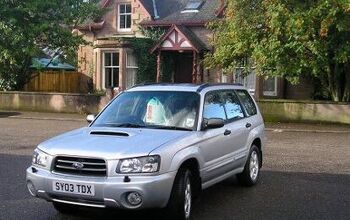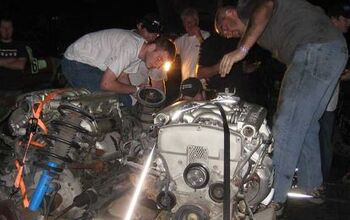How to Buy a Used Car – Pt. 1: First Contact
Used cars give automobile buyers the best possible bang for the buck– except when they don’t. As a professional dealer, I could tell you stories of used car calamities that would make public transportation seem like the only sensible option. Tales of stitched together death traps that looked as new as the day both cars were born. Cars with supposedly clean registration papers that turned out to be hotter than Peachtree Street in mid-August. Instead, I’m going to tell you how to buy a used car without getting your proverbial clock cleaned.
Finding an appropriate used car is a pretty simple business: decide what kind of car you want, research it online (especially model and brand-specific enthusiasts’ sites) and then go out and find one.
You can find a great car at a variety of sources: private, owner, independent used car dealer, used car superstores, new car dealer; even a "buy here / pay here" lot might stock a great vehicle or two (credit the law of averages). On a percentage basis, I've found that private owners and independent dealers offer the best bang for the buck. Conversely, your neighborhood impound lot or public auction is a no-no nadir.
When you make contact with the seller, ask for the car’s VIN (Vehicle Identification Number). That’s the government-mandated ID code welded onto the car’s chassis (and attached elsewhere), and listed on the car’s registration papers. Thank the seller for the info, tell them you’ll call them back, and hit the ‘Net.
Plug the car’s VIN number into Carfax’ or Autocheck’s on-line database. For a nominal fee, these sites will tell you if the car’s been flooded, torched, stolen, crashed, rebuilt, salvaged or had its odometer rolled back. Equally important, it’ll let you know if the car was a rental, a fleet vehicle or had a long series of owners (i.e. sporty models with neglectful owners are financial time bombs).
This due diligence must be done, but the information is far from perfect. Any damage not filed in an accident report won't show up. Arbitration issues can also fall through the cracks. When our own Frank Williams checked an Audi he once owned, the report made no mention of the fact that Audi bought back the car under Lemon Law provisions.
To fill the holes in a used car’s mission critical history, it pays to dig a little deeper.
Contact the service department at the brand-appropriate dealership closest to the car’s original registration (listed in the Carfax or Autocheck report). Give them the car's VIN and ask if the vehicle is subject to any “open recalls:” mechanical issues the manufacture must repair at their cost, no matter what. You'll need to check the seller's records to see if the work's been done. (If not, you could have a bargain; I've bought dozens of "defective" Volvos whose owners were unaware of a throttle body recall.)
Next, ask the service advisor for a maintenance report. By law, dealers can’t print out the information or give the owner’s name. But they CAN verbally report a car’s service history. If you’ve got the wrong dealership, contact the seller and ask where the car was serviced.
This brings us back to your most important source of car-specific information: the seller.
After you’ve secured the VIN and done your homework, call the seller back. There are dozens of excellent questions you can ask, and one you shouldn’t: what’s the price? Avoid negotiating price for the same reason you wouldn’t bid on a house without looking inside. Here’s how I do it:
“I like to catch up on maintenance whenever I buy a car. Can you tell me where the car was serviced, what you’ve done lately and if there’s anything else I’ll need to do in the next year or so?”
“I usually have my cars inspected at ‘x’. If I like the car, would it be OK to have it inspected?”
I always use conditional words and phrases– “Can you… would… do you know…is it possible." It's non-threatening, and the polite approach encourages the owner to provide additional information.
Thank the seller; you’ll call them back when you’re ready to make a firm offer.
If confidence is still high, it's time to determine an appropriate bid. Forget Edmunds, Kelly Blue Book and NADA. For popular late model used automobiles, eBay’s ‘Completed Items’ section is the only pricing guide that matters. Specifically, check out your prospective purchase’s green “ending price." The number reflects the final purchase price for cars that actually sold in the marketplace.
If there aren’t any recent or enough listings, go to your local bank or credit union. Tell them you’re looking at buying a used car and ask them to print out the relevant bit of the Manheim Market Report (MMR). The MMR lists wholesale and retail used car prices based on millions of recent transactions. Although the MMR is not for public consumption, almost all financial institutions with an auto lending department have access to this information.
Time for a bid? Nope. Time for a test drive.
[Mr. Lang invites readers to share their used car buying advice
and their used car triumphs and tragedies below.]
More by Steven Lang
Latest Car Reviews
Read moreLatest Product Reviews
Read moreRecent Comments
- ToolGuy Why would they change the grille?
- Oberkanone Nissan proved it can skillfully put new frosting on an old cake with Frontier and Z. Yet, Nissan dealers are so broken they are not good at selling the Frontier. Z production is so minimal I've yet to see one. Could Nissan boost sales? Sure. I've heard Nissan plans to regain share at the low end of the market. Kicks, Versa and lower priced trims of their mainstream SUV's. I just don't see dealerships being motivated to support this effort. Nissan is just about as exciting and compelling as a CVT.
- ToolGuy Anyone who knows, is this the (preliminary) work of the Ford Skunk Works?
- Kwik_Shift_Pro4X I will drive my Frontier into the ground, but for a daily, I'd go with a perfectly fine Versa SR or Mazda3.
- Zerofoo The green arguments for EVs here are interesting...lithium, cobalt and nickel mines are some of the most polluting things on this planet - even more so when they are operated in 3rd world countries.


































Comments
Join the conversation
And at the risk of being flamed, I believe that a new car purchase can make a lot of sense if financed properly.
I agree that this is excellent information. I would like to point out that our Chevrolet dealership just west of Detroit, George Matick Chevrolet, uses Corvette Specialists. These individuals have to pass special testing, and have to really be on their game in terms of discussing and demonstrating the Corvette. We do have many customers who do not even want to drive the car until after their purchase, but qualified prospects who wish to drive certainly may do so!